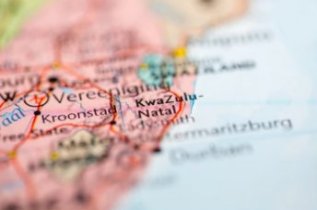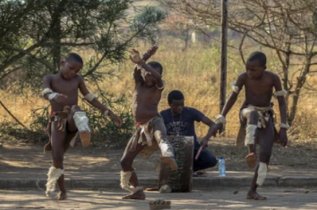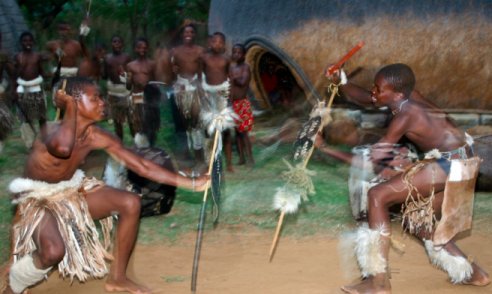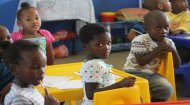|
Unlike in many cultures, Zulu children are named even before they are born and, after birth, an imbeleko ceremony is held to introduce them to their ancestors who live in the spirit world of unkulunkulu. In addition to their given name, Zulu boys are traditionally given a further name by their father when they are seven and they may also be known by another nickname given by herding friends. For a Zulu child, life begins within the embrace of an extended family and a close-knit community. The umndeni (family) is not merely a nuclear unit but a broad network of relatives, including grandparents, aunts, uncles, and cousins, all playing a role in a child's upbringing. Respect for elders (ukuhlonipha) is instilled from a very young age, forming the bedrock of social interaction. Children learn early that their identity is inextricably linked to their family lineage and their umphakathi (community), fostering a deep sense of belonging and collective responsibility. Traditional Zulu culture places immense value on oral history, storytelling (izinganekwane), song, and dance. Long before formal schooling, children absorb moral lessons, historical narratives, and practical knowledge through these vibrant cultural expressions. Play is not merely recreation but a vital tool for learning, involving traditional games that teach coordination, social interaction, and problem-solving. Gender roles, though evolving, traditionally begin to manifest early, with boys often engaging in activities related to herding and outdoor tasks, while girls learn domestic skills from their mothers and grandmothers. This communal and culturally rich environment forms the foundational schooling for every Zulu child, building resilience and a strong sense of cultural pride. The daily routines of Zulu children vary significantly depending on whether they live in rural, peri-urban, or urban settings. In traditional rural villages, a day for a young child might begin with the sounds of the homestead waking up – the crowing of roosters, the lowing of cattle, and the murmur of adults preparing for the day. Infants are often carried on their mothers' backs in traditional fabric slings (umbhaco), allowing them to observe and interact with their surroundings as their mothers go about their chores.
For primary school-aged children (roughly 6-13 years), formal education becomes a central part of their lives. Many walk long distances to school, sometimes several kilometres, often in groups for safety and companionship. School days are typically structured, focusing on core subjects like English, isiZulu, Mathematics, and Life Orientation. After school, chores resume. In rural areas, this might involve fetching water from communal taps or rivers, gathering firewood, tending to small gardens, or assisting with livestock. For those in more urban settings, chores might be confined to household tasks, but the expectation of contributing to the family unit remains strong. Evenings are often spent doing homework, sharing meals, and listening to family stories, reinforcing the bonds of kinship. The adolescence period of life for Zulu children is a period of significant transition, marked by increased responsibilities, the pursuit of secondary education, and the complex interplay between traditional values and global influences. Teenagers are expected to make substantial contributions to the household, both economically and domestically. Older girls might take on significant cooking, cleaning, and childcare duties, while boys might be involved in more arduous agricultural tasks or seeking informal employment to supplement family income. Secondary school becomes a gateway to future opportunities, and academic pressures can be intense. Many young people aspire to higher education or skilled professions, seeking to break cycles of poverty. However, this pursuit often conflicts with traditional expectations or the immediate need to contribute to the family. The allure of urban centres and modern lifestyles, amplified by social media and global trends, can also create a generational gap, with youth sometimes struggling to reconcile traditional customs with their contemporary aspirations. Cultural rites of passage, though less universally practised in their original form than in previous generations, still hold significance in some communities. For example, umemulo is a traditional ceremony for young women marking their coming of age, celebrating their purity and readiness for marriage. Boys' rites are less formal today but still emphasise the transition into manhood through responsible behaviour and community contribution. While traditional practices evolve, the underlying values of respect, community, and family continue to guide adolescents as they forge their identities. |
Life for Zulu Children | Life for Zulu Children | Life for Zulu Children | Life for Zulu Children |
 |
Life for Zulu Children in South Africa Despite their strong cultural foundations and inherent resilience, Zulu children, particularly those in rural and impoverished areas, face a myriad of systemic challenges that significantly impact their daily lives and future prospects. Socio-economic Disparities: Poverty remains the most pervasive challenge. High unemployment rates in KwaZulu-Natal mean that many households struggle to meet basic needs. This leads to food insecurity, affecting children's nutrition and cognitive development. Lack of access to basic services like clean running water, adequate sanitation, and reliable electricity further exacerbates living conditions, increasing the burden of disease and limiting opportunities for study at home. Access to Quality Education: While primary school enrollment rates are generally high, the quality of education can be severely compromised. Rural schools often suffer from dilapidated infrastructure, lack of learning materials, overcrowded classrooms, and a shortage of qualified teachers. Long distances to school, especially for secondary students, can lead to chronic fatigue and high dropout rates. The language barrier can also be an issue, as English is the medium of instruction for many subjects, despite isiZulu being their mother tongue. Healthcare Burden: Zulu children are disproportionately affected by the legacy of the HIV/AIDS epidemic, which has left many orphaned or living in child-headed households. This vulnerability often leads to food insecurity, emotional trauma, and increased susceptibility to other illnesses. Furthermore, limited access to local clinics, long waiting times, and a scarcity of essential medicines can impede timely and effective healthcare for common childhood illnesses, malnutrition, and infectious diseases like TB. Social Issues and Vulnerability: The breakdown of traditional family structures due to urbanisation, migration for work, and the impact of diseases can leave children without adequate adult supervision and support. This vulnerability can expose them to higher risks of child labour, exploitation, and various forms of abuse (physical, emotional, and sexual). Gender-based violence, though a national issue, tragically impacts many young girls, curtailing their freedom and well-being. Additionally, the clash between traditional and modern values can sometimes lead to intergenerational conflict and identity crises among youth. Environmental Factors: Many rural Zulu communities rely on subsistence farming, making children and their families highly susceptible to the impacts of climate change. Erratic weather patterns, including prolonged droughts and increasingly severe floods, threaten food security and water availability, further compounding poverty and health risks. Resilience, Aspirations, and the Path Forward: Despite these daunting challenges, Zulu children exhibit remarkable resilience, adaptability, and an optimistic spirit. Their strong communal bonds, coupled with a deep reverence for their heritage, provide a powerful support system. Community initiatives, government social grants, and the tireless efforts of non-governmental organisations play a crucial role in providing support, improving access to education, healthcare, and protective services. The aspirations of Zulu children are no different from those anywhere in the world: to learn, to grow, to contribute, and to thrive. They dream of becoming doctors, teachers, engineers, artists, and leaders. Indeed, whilst many Zulu children are brought up traditionally, others have adopted a more westernised lifestyle, with those living in more urban areas happily watching television and going to the movies as popular pastimes, dressed in their USA clothes and listening to western music. Their future lies in balancing the preservation of their unique cultural identity with embracing the opportunities of a modern, interconnected world. Supporting their access to quality education, healthcare, and safe environments is paramount to empowering them to overcome historical disadvantages and build a prosperous future for themselves and their communities. The daily life of Zulu children is a tapestry woven with threads of deep cultural heritage, familial love, communal responsibility, and the universal joys of childhood. Yet, this vibrant existence is often overshadowed by significant socio-economic and systemic challenges. Understanding their unique experiences – the blend of tradition and modernity, the resilience forged in adversity, and the profound aspirations that drive them – is crucial. By acknowledging and addressing these multifaceted challenges, society can better support Zulu children in realising their full potential, ensuring that the next generation of this proud nation can flourish and continue to enrich the world with their enduring spirit. Together with the video of Zulu children dancing, above are details of projects and programs to support the lives of Zulu children in South Africa. |

 As they grow into toddlers and young children, their responsibilities gradually increase. They may be tasked with simple chores: sweeping the yard, fetching small items, or, most commonly, looking after younger siblings. This responsibility of ukugada (looking after) is a significant aspect of Zulu childhood, teaching empathy, leadership, and patience. Play often involves imaginative games mimicking adult roles, using items found in nature as toys. Learning is largely experiential; they absorb knowledge by observing adults, participating in communal activities, and listening to the wisdom shared by elders.
As they grow into toddlers and young children, their responsibilities gradually increase. They may be tasked with simple chores: sweeping the yard, fetching small items, or, most commonly, looking after younger siblings. This responsibility of ukugada (looking after) is a significant aspect of Zulu childhood, teaching empathy, leadership, and patience. Play often involves imaginative games mimicking adult roles, using items found in nature as toys. Learning is largely experiential; they absorb knowledge by observing adults, participating in communal activities, and listening to the wisdom shared by elders.






